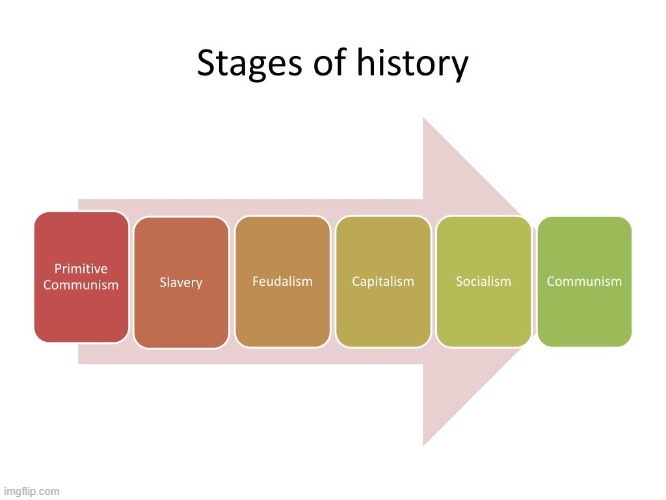How would you know, honestly?
You've never read Marx. You have no clue what the subject is - you only know that your party supports Marxism - so you do.
Of course Marx did not write of "stages of capitalism" as that would be utterly stupid. Marx wrote of the stages of HISTORY and organizational structures. The OP is simply ignorant.
-------------------------------------------------
1) the tribal form. Tribal society has no social classes but is structured around kinship relations, with hunting the province of men and domestic work the province of women. The tribal form, according to Marx and Engels, is quite elementary at this stage, "a further extension of the natural division of labour existing in the family" (44). During this stage, it is also possible to see a slave culture established, particularly as the population increases, leading to "the growth of wants" and the growth of relations with outside civilizations (through war or barter). With slave culture, we see the beginning of class society.
2) primitive communism: "the ancient communal and State ownership which proceeds especially from the union of several tribes into a city by agreement or by conquest" (44). During this stage, the concept of private property begins to develop: "With the development of private property, we find here for the first time the same conditions which we shall find again, only on a more extensive scale, with modern private property. On the one hand, the concentration of private property...; on the other hand, coupled with this, the transformation of the plebeian small peasantry into a proletariat" (44-45).
3) feudal or estate property: "Like tribal and communal ownership, it is based again on a community; but the directly producing class standing over against it is not, as in the case of the ancient community, the slaves, but the enserfed small peasantry" (45). In the city, the feudal structure manifested itself in trade guilds. The organization of both the country and the city "was determined by the restricted conditions of production—the small-scale and primitive cultivation of the land, and the craft type of industry" (46), which meant that there "was little division of labour in the heyday of feudalism" (46). Exploitation functioned differently during stage than during the heigth of capitalism because each feudal peasant knew exactly what proportion of his labor had to be handed over to the aristocracy and the church; the rest was his or hers to use.
4) capitalism: because of the eventual growth of commerce (and of human populations), feudal society began to accumulate capital, which, along with the increased debt incurred by the aristocracy, eventually led to the English Revolution of 1640 and the French Revolution of 1789, both of which opened the way for the establishment of a society structured around commodities and profit (i.e. capitalism). In such a society, the proletariat is fooled into believing that s/he is free because s/he is paid for his/her labor. In fact, the transformation of labor into an abstract quantity that can be bought and sold on the market leads to the exploitation of the proletariat, benefitting a small percentage of the population in control of capital. The working class thus experiences alienation since the members of this class feel they are not in control of the forces driving them into a given job. The reason for this situation is that someone else owns the means of production, which are treated like private property.
https://www.cla.purdue.edu/academic/english/theory/marxism/modules/marxstages.html
